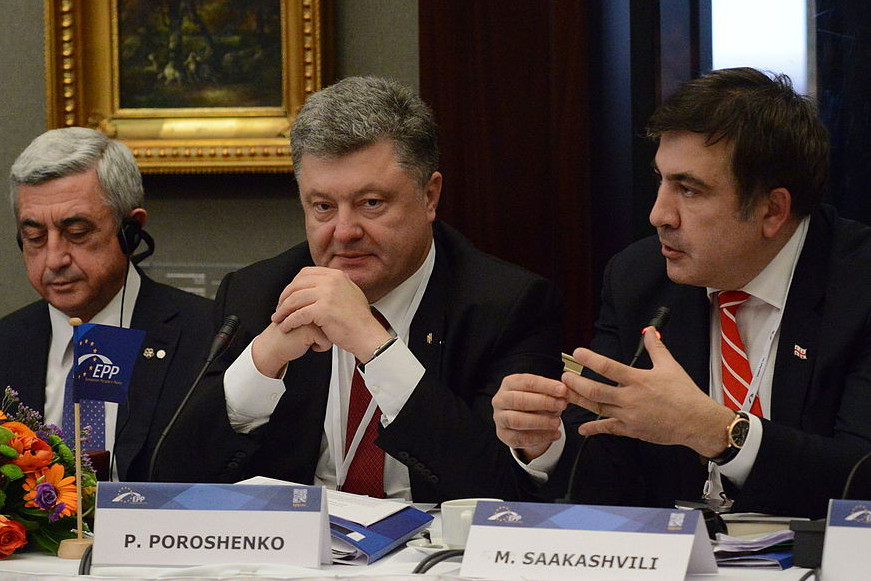Ukrainian president Poroshenko's time runs out. Voters have grown impatient with pervasive corruption and the suffocating reality of a state dominated by oligarchs. Poroshenko is becoming paranoid about his critics, and that's why he stripped his former ally Saakashvili of his Ukrainian citizenship. Media that focus on that scandal miss the point, says journalist Maxim Eristavi in an op-ed for the Washington Post. Ukrainian democracy is in danger.
by Maxim Eristavi
Ukraine made news by making Mikhail Saakashvili stateless for the second time in his career. Barely two years have passed since the leaders of post-revolutionary Ukraine invited the former Georgian leader to their country to support its reform program. They offered him a Ukrainian passport as part of the bargain. Since his vindictive political opponents back home in Georgia had already stripped him of his citizenship there, he was happy to accept the offer.
 Poroshenko and Saakashvili in May 2015, when they still were allies.Photo Wikimedia
Poroshenko and Saakashvili in May 2015, when they still were allies.Photo Wikimedia
His experiment in trans-border politics has now collapsed, and Saakashvili is crying foul, accusing Ukrainian President Petro Poroshenko of engaging in a political vendetta. (Over the past year Saakashvili has become one of Poroshenko’s harshest critics, which likely prompted the government’s action.) The presidential administration is now attacking Saakashvili for allegedly lying on his citizenship application form.
It’s a juicy scandal, so it’s understandable that the international media are transfixed by the story. Yet most of the breathless commentary is missing the point. Ukrainian democracy is in serious danger.
Both sides have an interest in making this story all about Saakashvili and his polarizing personality. But both are also using it to conceal less palatable and far more important issues. Poroshenko wants to distract attention from his intensifying drive to crush dissenting voices, while Saakashvili aims to obscure the ignominious failure of his career. Of these two, the first is by far the more important.
No power base
Poroshenko’s animus might be easier to understand if Saakashvili posed a threat to him. But Saakashvili doesn’t have a power base of his own in Ukraine, and his popularity ratings are notably weak. Poroshenko’s problem is that he’s equally vulnerable. Ever since he became president in 2014, he and his ruling party have been hemorrhaging popular support. Not a single poll gives him a chance of victory in the 2019 election.
Playing on the need for European integration or the Russian war against Ukraine doesn’t work the old magic on voters anymore, who have grown impatient with pervasive corruption and the suffocating reality of a state dominated by oligarchs.
As his time runs out, the Ukrainian leader is growing paranoid about his critics. This is the only reason Poroshenko would dare to strip Saakashvili of his citizenship, an apparent violation of international law that will do little to boost Ukraine’s international reputation. Saakashvili is not a serious electoral rival, but still has privileged access to the global media, which he is using to share embarrassing stories about corruption in Poroshenko’s inner circles.
Battling opponents
Running on the promise of destroying the oligarchic state in 2014, Poroshenko has ended up as its fiercest defender. He now seems to be spending more of his time battling opponents than tackling the country’s urgent problems. Poroshenko’s ruling party is calling for the investigation and jailing of his main opponent, Yulia Tymoshenko, on treason charges. Andriy Sadovyi, the mayor of Lviv in western Ukraine and the second-most-popular politician in the country, is accusing Poroshenko of sabotaging trash collection in the city as a way of undermining his support. Some of the president’s fiercest critics in the parliament complain of being wiretapped.
Poroshenko has ended up as the fiercest defender of the oligarchic state
Meanwhile, Poroshenko is also backing away from fighting corruption. When the newly created National Anti-Corruption Bureau started going after Poroshenko’s key allies, his ruling party launched a ruthless legislative campaign against it. The general prosecutor, who answers to the president, has just announced a criminal probe of the people running new anti-graft institutions. The ruling party and the presidential administration keep coming up with new legislative and procedural tricks against the country’s emerging anti-corruption movement on the weekly basis. It’s like fixing one leaking hole in a ship while two more open up. Many activists complain to me that the battle is becoming exhausting.
Civil society targeted
Finally, the president is also targeting the country’s civil society — the same groups that made the 2014 Maidan Revolution possible and have been pushing forward with reforms since then. When reformist activists stood up for the anti-corruption fighters, the ruling party tried to muzzle them with harsh non-disclosure laws. Additionally, the authorities are bullying the independent press, and journalists live in fear.
You would never hear about any of this from Poroshenko’s polished speeches targeting his foreign audience. One of his favorite lines depicts Ukraine as the region’s 'beacon of freedom' against Russian authoritarianism. But that’s just his shtick for gullible foreigners. At home he openly praises the authoritarian leaders of Turkey, Azerbaijan and Belarus. When Belarusan leader Alexander Lukashenko visited Kiev recently, he was heckled by a pro-democratic protester while standing next to Poroshenko. The protester now faces up to five years in jail.
Many international media would see in this latest grotesque strife between two opportunistic politicians in Ukraine another episode of the usual Eastern European soap opera. But that’s not the real story. Forget the personal intrigues. The bottom line is this: Our democracy is under attack.
This article was republished with permission of the Washington Post
